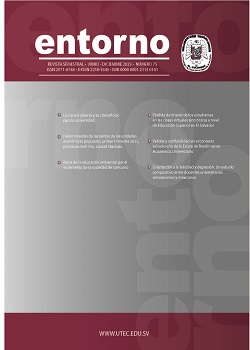Loss of Student Interest in Synchronous Virtual Classes at the Higher Education Level in El Salvador
Published 2023-01-01
Keywords
- Teaching systems,
- Internet education,
- Educational innovations,
- Academic performance,
- Motivation in education
Copyright (c) 2023 Universidad Tecnológica de El Salvador

This work is licensed under a Creative Commons Attribution-NonCommercial-ShareAlike 4.0 International License.
How to Cite
Abstract
A synchronous online education model can have several benefits. First of all, it allows students to have real-time interactions with their professors and classmates; this can improve the quality of teaching and learning, and students can participate in group discussions and activities more effectively. This interaction can in return enhance their ability to carry out teamwork and be more open to collaborate. This mode of instruction can also be more convenient for students who have busy schedules or live far from their universities. Nonetheless, one of the challenges faced by professors who work online, is the loss of interest that students show in the teaching-learning process. This situation is worrisome since it can have a negative impact on the academic performance of the students; it also decreases their opportunity to graduate.
Given this concern, it is important to understand the contributing causes of the students’ loss of interest in the teaching-learning process of online synchronous classes. These online classes take into consideration the teaching skills, the technological factors, and the study environment of El Salvador’s university students attending institutions located in the metropolitan area of the country, since the coverage, connectivity and quality of internet services is better than in other areas. For the study, a bibliographic review of different authors who are similar to the subject has been carried out, as well as empirical data from a study carried out by the Latin American Technical University (UTLA) has been taken as a reference, in university professors from eight educational institutions. university in El Salvador in 2020, on the impact of the COVID-19 pandemic on non-face-to-face classes and another by the Francisco Gavidia University (UFG), on the problems of virtual education in times of Covid-19, Both studies reflect a series of important findings for this study, which reflects that not only are teachers trained in the use of virtual platforms or technological tools needed, education in virtual ecosystems entails a set of technical, didactic, and pedagogical skills to achieve objective and quality learning.
References
- Acaro Chacón, X. C., Molina Miranda, M. F. y Molina Villacís, M. G. (2022). Evaluación de los niveles de exposición de ruido en aulas de aprendizaje virtual. Mikarimin: Revista Multidisciplinaria, 8(1), 71-78. https://core.ac.uk/download/pdf/524811474.pdf
- Barrera Rea, V. F. y Guapi Mullo, A. (julio, 2018). La importancia del uso de las plataformas virtuales en la educación superior. Atlante: Cuadernos de Educación y Desarrollo. https://www.eumed.net/rev/atlante/2018/07/plataformas-virtuales-educacion.html//hdl.handle.net/20.500.11763/atlante1807plataformas-virtuales-educacion
- Bordoli, E. y Romano, A. (2021). Presentación de la Revista Fermentario, Dossier El lugar de la enunciación de la teoría. Revista Fermentario, 12(1), 1–4. https://doi.org/10.47965/fermen.12.1.1
- Cando Lagla, S. M. (01 de abril del 2021). Actividades de interacción social adaptadas a la educación del nivel inicial - modalidad en línea. [Tesis de pregrado, Universidad Técnica de Ambato] https://repositorio.uta.edu.ec/bitstream/123456789/32697/1/TRABAJO%20FINAL%20SANDY%20CANDO%2031%2003%202021-signed.pdf
- Cruzat, E. (noviembre, 2020). Ensayo temático: “El rol del docente ante la clase virtual”. Práctica Familiar Rural, 5(3). https://doi.org/10.23936/pfr.v5i3.176
- Dirección General de Estadística y Censos. (2021). Encuesta de hogares de propósitos múltiples 2020. Ministerio de Economía.
- Kemp, Simón (16 de febrero del 2022). Digital 2022: El Salvador. Kepios. https://datareportal.com/reports/digital-2022-el-salvador
- Ledesma-Ayora, M. (2014). Análisis de la teoría de Vygotsky para la reconstrucción de la inteligencia social. Universidad Católica de Cuenca.
- López, F. A. (27 de julio del 2020). Las problemáticas de la educación virtual en tiempos del Covid-19. Disruptiva: Periodismo, Ciencia y Tecnología. https://www.disruptiva.media/las-problematicas-de-la-educacion-virtual-en-tiempos-del-covid-19/
- Ministerio de Trabajo y Previsión Social. (2012). Reglamento general de prevención de riesgos en los lugares de trabajo.
- Moodle. (s. f.). Registered Moodle sites. https://stats.moodle.org/sites/index.php?country=SV
- Noriega Frotando, L. A. y Torres Duran, E. (2011). Aulas virtuales: ¿Desarrollo pedagógico y didáctico o avance tecnológico? [Tesis de pregrado, Universidad Militar Nueva Granada]. https://repository.unimilitar.edu.co/bitstream/handle /10654/5383/
- NoriegaFrontadoLuisAntonio2011.pdf?sequence=2&isAllowed=ynPerf. (s. f.). Speed test: Test de velocidad para tu conexión ADSL, VDSL, cable, fibra o satélite. https://www.nperf.com/es/
- Reynado Rivas, M. G. (2020). Impacto de la pandemia del covid-19 en los docentes de las instituciones de educación superior que conforman CONARES. UTLA. http://redicces.org.sv/jspui/handle/10972/5000
- Rizo Rodríguez, M. (2020). Rol del docente y estudiante en la educación virtual. Revista Multi-Ensayos, 6(12), 28-37.

